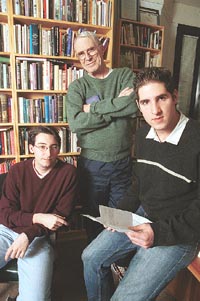Euphony makes its debut on campus
Arthur FournierNews Office
Shortly after the Thanksgiving holiday, an ambitious new journal of literature, drama, visual art and philosophy found its place on University newsstands for the first time. The inaugural issue of Euphony boasts new writing by more than a dozen Chicago undergraduates as well as nationally known poet David Lehman.
 Students Matthew Deming (left) and Stephen Barbara (right) have created a new literary magazine that features student writing. Professor Mark Strand (center) serves as an adviser to the magazine, which is called Euphony. |
Late last winter, Barbara, a third-year student in English Language & Literature, and Deming, a fourth-year double concentrator in English and the Biological Sciences, realized they shared a common dissatisfaction with what they perceived as a limited range of opportunities for College students to publish original artwork and writing in journal format.
The two met in Modern Fiction: Religion/Irreligion, a class that Mark Krupnick, Professor in the Divinity School, taught last year. Deming and Barbara discovered that they had a similar admiration for great literature.
In the spring of 2000, the two enlisted their friends and organized an introductory meeting on the first Wednesday of the quarter. That same week, they applied to become a recognized student organization eligible for University Student Government funding.
They also asked Mark Strand, Pulitzer prize-winning poet and Professor in the Committee on Social Thought, if he would serve as their faculty adviser. Strand agreed, and with his guidance, Barbara, Deming and Euphony’s growing cadre of staff and volunteers met for 10 successive Wednesdays to shape the first issue of the journal.
“At the beginning, we set such a high standard for ourselves that it was almost ridiculous,” remembered Barbara. “For our first meeting, we had eight people. Matthew and I explained to them that we weren’t joking around, and that we planned to do things seriously and to aim for greatness. But the thing that happened was that those same people came back every week and absolutely held us to our own standards. It was really their expectations that kept us at the top of our game.”
Deming added, “We had so much energy. We hung fliers all around campus and with Mark Strand’s encouragement, we sent solicitation letters to some the world’s best contemporary poets.” The response to their campaign generated more than 180 pages of submissions that the group reviewed together during their weekly meetings.
Euphony’s democratic submission review process is key to the journal’s eclectic offer-ings. “We really don’t want to give off an insider feel,” said Deming. “The only editorial principle we have is to publish anything that a majority of the staff thinks is good.”
The process of arguing the relative merits of a given submission among members of Euphony’s editorial group also has functioned as a kind of bonding ritual.
“I would say that we’re really starting to function as a community,” said Barbara.
Strand said he is hopeful for their efforts to kindle literary excitement in the College. “In today’s world, I think that can be a difficult task,” he said. “But the real payoff for this sort of thing happens years down the road. What they’re actually doing is sharpening their editorial skills and encouraging others their age to take writing seriously. It is an experience from which they should derive a great deal of satisfaction. More power to them,” he continued.
At the most basic level, Barbara and Deming said they will be satisfied if Euphony becomes something in which students on campus, especially writers, can take pride. Despite their humility, they seem certain the future of Euphony holds great things.
“But part of the goal, of course,” said Deming, “is to earn the recognition of readers far beyond Hyde Park.”
![[Chronicle]](/images/small-header.gif)